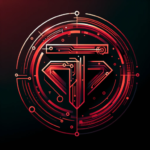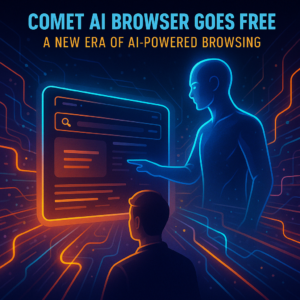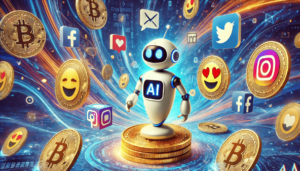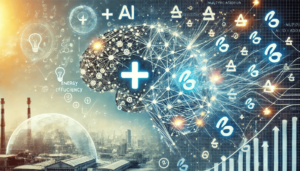AI’s Key to Ancient Wisdom Locked in Herculaneum Papyri
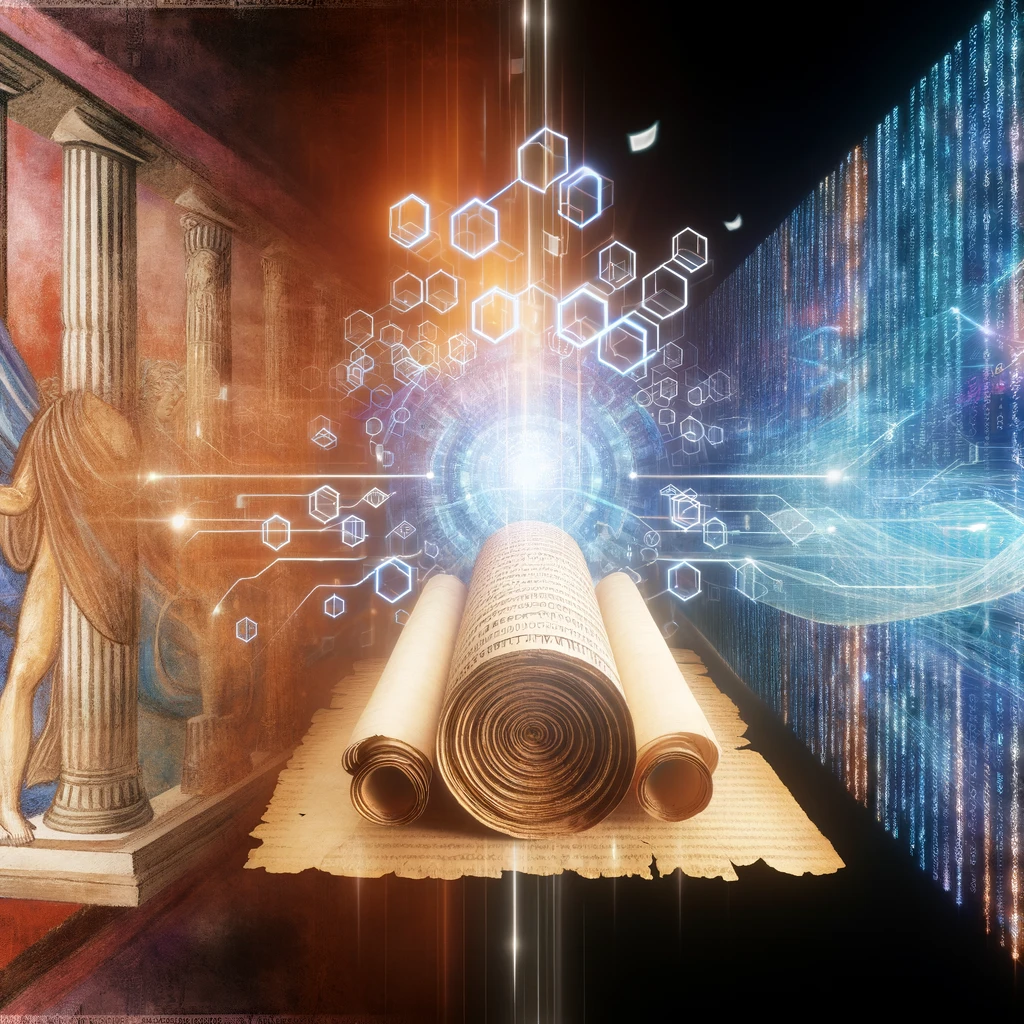
A fusion of past and future, where artificial intelligence reveals the hidden wisdom of ancient Herculaneum papyri, blending classical scrolls with the digital age.
- What are the Herculaneum papyri, and why are they significant?
- How has artificial intelligence been used to decipher the Herculaneum papyri?
- What did the first successfully deciphered ancient scroll reveal?
- What are the broader implications of using AI in archaeology and historical research?
- What future possibilities and challenges does the AI-assisted deciphering of ancient texts present?
Beneath the remnants of Mount Vesuvius’s catastrophic embrace, a breakthrough in artificial intelligence has pierced through centuries of silence, offering a voice to the ancient Epicurean philosophers of Herculaneum. Preserved yet concealed by the 79 AD eruption, the carbonized papyrus scrolls of a once-thriving library have eluded scholars’ grasp, their secrets locked within fragile coils. Now, as reported by Wired.it, a monumental stride in AI technology has achieved what was once deemed impossible: the virtual unrolling and reading of these texts, casting light on the intellectual pursuits that flourished in the shadow of Vesuvius. This achievement not only marks a significant leap in the field of digital archaeology but also sets a precedent for future endeavors in uncovering the depths of our shared human heritage. Through the lens of the Vesuvius Challenge—a testament to the synergy of competitive innovation and scholarly ambition—this revelation beckons us to explore the nuanced dialogues of the past, inviting a reevaluation of our historical narratives and their resonance in the modern world.
Background Information
The Herculaneum papyri stand as silent witnesses to the rich intellectual legacy of Epicurean philosophy, once thriving within the Villa of the Papyri. This ancient school of thought, which championed the pursuit of happiness through understanding the mechanisms of the world and nurturing human connections, is vividly captured in the scrolls that survived Vesuvius’s devastating eruption. These papyri are more than mere relics; they offer unparalleled insights into the minds of philosophers who lived over two thousand years ago, presenting a unique opportunity to bridge the ancient and modern worlds. Yet, the fragility of their carbonized state has long hindered direct access to their wisdom.
The Vesuvius Challenge emerged as a pioneering solution to this dilemma, spearheaded by Brent Seales, a visionary in the realm of digital archaeology. With a significant reward of $700,000, this challenge galvanized the global community to apply artificial intelligence towards revealing the papyri’s secrets. Youssef Nader, Luke Farritor, and Julian Schilliger, a trio of innovative researchers, rose to the occasion. Utilizing advanced imaging techniques and AI algorithms, they achieved what was once thought impossible: virtually unrolling a scroll to disclose its contents for the first time in millennia.
This landmark achievement transcends academic curiosity, heralding a new era in our engagement with ancient knowledge. By marrying cutting-edge technology with classical studies, the effort not only promises to enrich our understanding of Epicurean thought but also opens the door to rediscovering lost texts from the likes of Aristotle and Sappho. The Vesuvius Challenge thus not only signifies a triumph in digital archaeology but also acts as a catalyst for a broader renaissance in the humanities, inviting us to reconsider the foundational philosophies that shape our understanding of happiness, friendship, and the nature of pleasure itself. Through the lens of these ancient texts, brought to light by modern AI, we are reminded of the enduring quest for knowledge that connects us across the ages.
The Breakthrough of AI
The successful application of artificial intelligence in deciphering the Herculaneum papyri marks a pivotal moment in the confluence of technology and the humanities. This achievement goes beyond traditional interdisciplinary efforts, showcasing a synergistic enhancement where technology not only aids but also fundamentally transforms historical scholarship. The AI algorithms, meticulously designed by Nader, Farritor, and Schilliger, were tailored specifically to meet the intricate challenges presented by the papyri’s carbonized state. Leveraging magnetic resonance imaging data provided by Brent Seales, their work achieved the unprecedented feat of virtually unrolling the scrolls, thus revealing content untouched by human hands since the first century AD.
This technological milestone allowed for the recovery of texts discussing Epicurean thought on sensory experiences and pleasures, enriching our comprehension of this ancient philosophical doctrine. The discovery suggests a broader and more complex engagement with Epicurean ideals than previously recognized, highlighting the potential of AI to bring nuanced voices from the past into present-day discourse.
Furthermore, this breakthrough delineates a new paradigm in how we approach the preservation and analysis of historical documents. It illustrates AI’s capacity not merely as a tool for revealing lost words but as a transformative force capable of addressing the grand challenge of accessing our shared heritage without the risk of physical damage to precious artifacts. The implications of this success extend far beyond the specific case of the Herculaneum scrolls; it signals a broader revolution in how we can interact with and understand historical texts, potentially unlocking a wealth of knowledge from civilizations whose written records have remained elusive or inaccessible.
The Vesuvius Challenge, therefore, represents not just a singular victory but a foundational step towards a future where AI’s role in archaeology and historical studies is integral. With ambitions to interpret 85% of an entire scroll by the end of 2024, the project continues to push the frontiers of what is achievable, promising to unearth further insights from the annals of history through the lens of advanced technology.
Revealed Contents
The unveiling of text from the first successfully unrolled papyrus by AI has been nothing short of unlocking a vault of ancient Epicurean discourse, casting a beam of light on discussions about the sensory experiences of music, food, and, fundamentally, pleasure. Such themes lie at the heart of Epicurean philosophy, which elevates pleasure to the pinnacle of human good. This groundbreaking decipherment not only broadens our grasp of Epicurean thought but also ushers us into the day-to-day intellectual life that thrived under the looming shadow of Vesuvius.
The content unveiled points to an authentic piece of literature, distinct from any previously known texts, thereby marking a significant addition to the corpus of ancient philosophical writings. This discovery challenges the previously held view of Epicureanism as a uniform doctrine, uncovering a more intricate dialogue on pleasure, its pursuits, and its implications on the human condition. It underscores the dynamic and progressive nature of ancient philosophical inquiry, contrasting sharply with the notion of these philosophies as mere relics of a static past.
Intriguingly, the author delves into the essence of pleasure and examines how its perception is influenced by the relative scarcity or abundance of goods, engaging with themes that transcend time. These reflections not only enrich our historical and philosophical understanding but also mirror contemporary debates on pleasure, well-being, and the culture of consumption.
The text’s closure, with its hint at ongoing discussions in possibly subsequent scrolls, opens the door to a vast intellectual lineage awaiting discovery. It hints at a rich tapestry of knowledge that could significantly recalibrate our understanding of Epicurean philosophy and its contributions to the broader field of ancient thought.
This revelation not only signifies a leap in our comprehension of Epicurean philosophy but also sets the stage for a reevaluation of ancient intellectual traditions. As we decipher more scrolls, we stand on the cusp of potentially reshaping our narrative of ancient philosophical discourse, offering a more nuanced appreciation of its complexity and relevance to contemporary discussions on happiness, ethics, and the pursuit of a good life.
Broader Implications
The advent of artificial intelligence in deciphering the Herculaneum papyri marks a pivotal shift not just within the realm of classical studies but across the entire spectrum of historical and cultural preservation. This advancement underlines AI’s capability as a transformative tool, capable of revealing the intricacies of civilizations previously obscured by the passage of time and the physical limitations of preservation methods. The discovery within the Villa of the Papyri is merely the beginning, hinting at a vast repository of knowledge—from potentially lost works of Aristotle and Sappho to Homer—that could redefine historical narratives and intellectual heritage.
This singular achievement opens up new vistas in the exploration of antiquity, suggesting the possibility of reshaping our historical consciousness with every scroll brought to light. Moreover, the methodologies honed through the Vesuvius Challenge promise to revolutionize our approach to other ancient texts, such as those used in Egyptian cartonnage, enabling scholars to access content without the risk of physical damage.
This breakthrough necessitates a reconsideration of technology’s role in the stewardship of our cultural heritage. AI’s synergy with classical studies exemplifies a dynamic interplay between technological innovation and historical inquiry, fostering an interdisciplinary collaboration that pushes the boundaries of what can be known about our past.
As we look toward the ambitious goal of deciphering 85% of an entire papyrus scroll by the end of 2024, we not only celebrate the strides made in AI and imaging technology but also acknowledge the burgeoning role these tools play in demystifying historical enigmas. This endeavor heralds a future where historical artifacts are no longer ensnared by deterioration or obscurity. Instead, AI serves as a conduit through which we can engage with the legacy of those who preceded us, enriching our understanding of human history and underscoring the timeless quest for knowledge.
Yet, as we venture further into this new frontier, we are confronted with ethical considerations and challenges—balancing the quest for discovery with the preservation of authenticity, ensuring equitable access to these revolutionary tools, and addressing the potential biases inherent in AI technologies. As we navigate these waters, the integration of AI in archaeology not only presents an opportunity to reclaim pieces of our shared human story but also compels us to reflect on how we honor and preserve the integrity of our collective heritage.
Future Possibilities and Challenges
The unveiling of texts from the Herculaneum papyri through AI paves the way for a future rich in discovery yet fraught with complexities. This groundbreaking achievement in marrying AI with archaeological and humanities research not only opens the door to the past but also projects us into a future where the mysteries of ancient civilizations could be unraveled one by one.
Future Discoveries and Innovations
The application of AI to ancient texts holds the promise of unveiling lost works and forgotten wisdom, providing fresh perspectives on the intellectual landscapes of bygone eras. This could revolutionize our understanding of ancient societies, their cultures, philosophies, and technological advancements.
The interdisciplinary fusion of AI with historical disciplines invites a new wave of research methodologies. It could enable the reconstruction of historical narratives, offer simulations of ancient technologies, and predict undiscovered archaeological sites with unprecedented precision.
AI and related technologies promise a new era of preservation, making delicate artifacts accessible for study without the risk of physical deterioration. This digital stewardship means that invaluable cultural and historical treasures can be safeguarded for posterity.
Navigating Challenges
The deployment of AI in deciphering historical documents introduces ethical challenges, particularly in the realms of interpretation. Ensuring AI interpretations remain unbiased and faithful to the original texts requires a vigilant approach to algorithm training and application.
The reliance on AI for historical analysis necessitates rigorous checks to safeguard against inaccuracies or the misinterpretation of ancient texts. Human oversight remains crucial to validate AI-generated insights, maintaining the authenticity of our historical understanding.
The disparity in access to cutting-edge AI technologies poses a significant challenge. Addressing this digital divide is critical to ensuring that the benefits of AI in archaeology and the humanities are shared broadly, fostering a more inclusive field of study.
Looking Ahead
The horizon is bright with the potential for AI to not just reveal the contents of ancient texts but to offer a multidimensional understanding of history. Yet, as we step into this new domain, the juxtaposition of immense possibilities against the backdrop of ethical and practical challenges reminds us of the careful balance required. Embracing the future of AI in archaeology and the humanities demands a commitment to ethical integrity, scholarly precision, and an inclusive approach to the dissemination of knowledge.
As we navigate this evolving landscape, the fusion of AI with the study of the past holds unparalleled promise for deepening our connection with human history. Yet, it also calls for a conscientious approach to ensure that our journey into the past enriches our present and informs our future with wisdom, respect, and integrity.
Concluding Thoughts
The advent of artificial intelligence within the spheres of historical studies and archaeology marks not just an evolution in technology but a profound shift in our engagement with history. This melding of modern computational power with the exploration of ancient texts and artifacts holds the promise of bridging millennia, offering insights into civilizations that have long whispered from the shadows of time.
Reflecting on this monumental shift, it becomes clear that the fusion of AI with the pursuit of historical knowledge transcends technological achievement. It signifies a renaissance in our relationship with history, allowing us to commune with our ancestors and their wisdom in unprecedented ways. This connection, facilitated by AI, offers us not just a lens into the past but a mirror reflecting our own time, challenging us to ponder the continuity of human experience across ages.
This technological renaissance also promises a democratization of history, making the rich tapestry of our collective past accessible to a global audience. This shift has the potential to dissolve barriers of access and language, inviting a wider engagement with the heritage that belongs to all humanity.
Yet, with great power comes great responsibility. As we step into this new era, the ethical stewardship of these technologies becomes paramount. The exhilaration of unlocking the secrets of the past must be balanced with a solemn commitment to preserving the integrity and authenticity of historical narratives. We must tread this path with a deep sense of respect for the legacies we explore, ensuring that our technological prowess serves as a tool for enlightenment, not erasure.
In essence, the integration of AI into historical inquiry invites us to a crossroads of past and future, where the wisdom of ancient times can inform our present and guide our way forward. As we navigate this junction, let us do so with humility, ethical vigilance, and an unwavering dedication to the truthful recounting of history. The journey ahead is laden with both promise and peril, yet the opportunity to deepen our understanding of the human saga is an unparalleled treasure.
As we embark on this journey, let us hold fast to a vision of the future where technology and history walk hand in hand, illuminating the past in ways that enrich our present and inform our future. Let this be a time marked by a renaissance of historical understanding, propelled by innovation, and guided by the moral compass of responsible stewardship.
